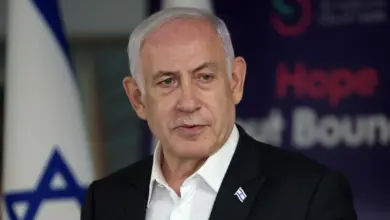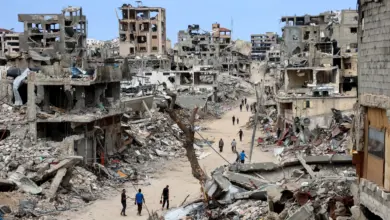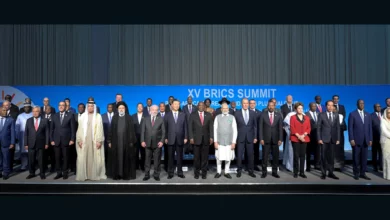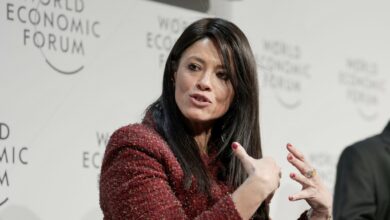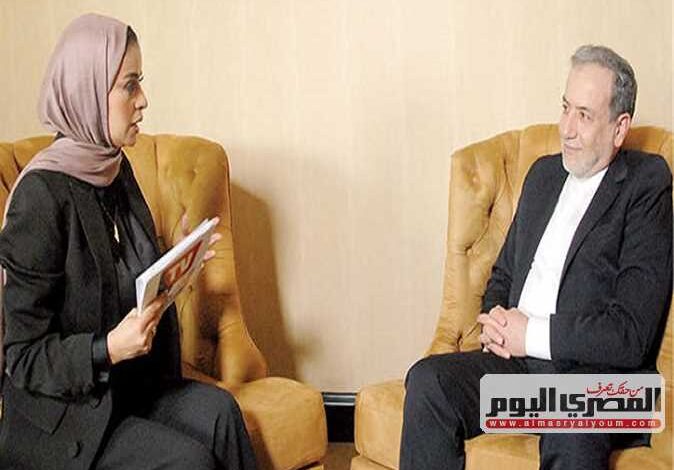
Iranian Foreign Minister Abbas Araghchi assumed office during a critical and highly sensitive period, with his country facing unprecedented regional escalation involving Israel and the US.
This comes amidst the already severe challenges confronting the Middle East, including the ongoing genocide carried out by Israeli forces in Gaza and the expansion of Israeli military operations into southern Lebanon.
In an exclusive interview with Al-Masry Al-Youm, Araghchi – who is visiting Egypt as part of a regional tour initiated last week – discussed the future of the Middle East and addressed accusations regarding Iran’s “agenda,” which some fear threatens Arab national security.
Araghchi stressed that efforts to demonize Iran have failed, and highlighted positive developments in relations with the “southern Gulf states,” citing his recent tour as evidence.
He clarified that Tehran has not issued any threats to close the Strait of Hormuz, pointed to the potential for forming a “regional alliance” between Iran and Turkey alongside Arab countries, particularly the Gulf states.
He suggested that this cooperation could begin with economic partnerships and eventually expand into strategic security cooperation, emphasizing the importance of regional alliances in tackling shared challenges.
During the interview, conducted just hours before the assassination of Hamas leader Yahya Sinwar, Araghchi warned that the Middle East is at a “highly dangerous” juncture that requires urgent regional coordination to deter “the crimes of the Zionist entity.”
He warned that the continuation of Israeli occupation practices could lead to the emergence of a “second Gaza” in Lebanon and potentially “third and fourth Gazas” in other regions, calling for a unified regional stance to confront these challenges.
Araghchi also criticized the US’s bias toward Israel, describing it as a fundamental cause of instability in the region.
He reiterated Iran’s support for the “one Palestinian state” solution, criticizing Israel’s proposal of a “municipality or mini-state” for Palestinians, devoid of sovereignty or a military.
He argued that such a solution would not bring sustainable peace but would instead exacerbate conflicts.
Furthermore, he hinted at Iran’s engagement with international perspectives advocating for a multi-polar world, asserting the decline of US global hegemony.
■ How does Iran view the future of the Middle East in light of the rapid developments in the region?
First, I would like to express my gratitude for the opportunity to speak with Al-Masry Al-Youm and its readers.
I believe the region is currently facing a highly dangerous situation.
In light of this, the Islamic Republic of Iran feels, more than ever, the urgent need for coordination and consultation among the region’s countries. We must work together to take firm stances that can halt the crimes committed by the Zionist entity in Gaza and Lebanon.
The countries of the region, along with the international community, must intensify their efforts to put an end to the atrocities committed by the Israeli occupation to prevent their expansion to other areas.
We’ve witnessed the genocide taking place in Gaza, where countless innocent lives have been lost, homes have been demolished, and hospitals and schools have been destroyed by this Zionist war.
Over 50,000 martyrs, most of them women and children, have fallen in Gaza. Given this, I believe there is a real possibility of witnessing a “second Gaza” in southern Lebanon if serious action isn’t taken to stop the Zionist aggressor.
Furthermore, this could escalate into a “third or fourth Gaza” in other neighboring regions if these crimes are not decisively confronted.
■ Iran is often accused of having an agenda that threatens some Arab countries and their national security. What is your response to these claims?
One year after the Zionist genocide in Gaza, and following the revelation of some of their expansionist plans, it has become clear that the primary threat to the region is the Zionist enemy. In light of these developments, I believe that all attempts to demonize Iran and the resistance axis have failed.
It is now undeniably clear who poses a real threat to the region, starting with Palestine and Lebanon and extending to the broader region.
Quite frankly, across all countries in the region, I see that there is now a consensus that the Zionist enemy is the main threat. Therefore, under these circumstances, it is incumbent upon us all to work together to extinguish this fire before it spreads to the entire region.
■ Is there any intention on Iran’s part to bridge differences and engage in agreements to enhance regional stability?
The countries that once criticized Iran for its policies now fully realize the real threat posed by the Zionist entity, especially after witnessing its actions that impact all of us.
■ There is talk about the possibility of establishing a regional alliance involving Iran, Turkey, and the Arab states to confront these threats. What is your take on this?
Yes, there is indeed potential for cooperation and integration among the region’s countries. Iran, Turkey, and the Arab countries can be strong allies. While forming a regional alliance might require preliminary steps and preparations, the Islamic Republic of Iran believes that we must move forward in this direction.
The nature of any potential alliance will depend on the specific region where the agreement is reached.
Generally, we can start with simpler, practical steps toward cooperation, such as economic partnerships, which could later evolve into security and strategic collaborations. I believe that the foundation for cooperation and alliances in the region exists, along with shared threats and mutual strategic interests.
■ What are the key aims of your diplomatic visit to Egypt?
Consultations between us and Egypt are ongoing, and we have an intention to continue these talks and strengthen our mutual cooperation. The ties between Egypt and the Islamic Republic of Iran are strong, and our relationship with Cairo is one based on mutual respect, even during diplomatic cut-offs.
Iran maintains very good relations with all the countries on the southern shore of the Persian Gulf, and these relations are currently advancing. Consultations between us on regional issues and our shared strategic interests continue, and over the past few days, I conducted regional tours that included many of these countries.
■ What is Iran’s view of US policies in the region?
The US can play a more effective role in establishing peace in the region by taking one simple step: stopping its support for the Zionist occupation and its crimes.
This single action would greatly contribute to establishing stability and peace in the region.
I believe that US’s bias toward the Zionist entity is what destabilizes our region. If the supply of American and Western weapons to Israel were to stop, many of the crimes we have witnessed in Gaza and later in Lebanon would not have occurred.
■ You mentioned that ending the war in Gaza is a priority for Tehran. How can this be achieved while Israel continues to expand its war and Iran escalates its military response on multiple fronts?
If the Zionist entity continues its current practices, it will undoubtedly face a new quagmire, similar to what it encountered in 2006 (the July War). However, we must not allow more massacres and destruction. The region must exert more pressure on Israel and the US to put an end to the war and to prevent further bloodshed.
■ Iran has been accused of threatening to close the Strait of Hormuz, while the Huthis threaten navigation in the Red Sea, creating tensions with many countries, including Saudi Arabia. What is your comment on that?
We have never threatened to close the Strait of Hormuz, and although Iran has significant capabilities in this regard, we have never brandished this option out of respect for our relationships with regional countries.
Our relationship with Saudi Arabia is very good and continues to develop positively.
■ What is your response to the term “New Middle East” in light of the unprecedented escalation in the region?
The so-called “New Middle East” is not a new plan. It failed when it was first proposed in the last century, and it will fail again. If we are indeed on the verge of a new regional order, I believe that this new system will be shaped by the will of the people, not by American desires.
Furthermore, the dominance of the US over the global system is waning.
We are witnessing the inability of the US to stop the Zionist entity’s actions, or at least that is what they claim. On the international stage, many countries are moving away from US hegemony, particularly in the global financial systems. The growing interest in joining the BRICS alliance, launched by emerging economies, is a clear reflection of this trend.
The world is gradually distancing itself from this system.
■ Israel has vowed a “lethal response” to Iran. On the other hand, you have said that Iran does not want war but is prepared for all scenarios. Can you explain this position?
Indeed, we do not want war, but we are ready for all possible scenarios. If Israel launches an attack on Iran, we will carefully assess it and determine how to respond. Our counter-response is ready, and the Israelis are free to test our resolve. No one in the region supports a scenario of large-scale war except for Israel’s Prime Minister, and we will not be drawn into a trap set by Netanyahu.
■ You have recently visited several countries in the region. What were the outcomes of your tour, particularly in Saudi Arabia?
Given the situation in the region, consultations on the regional situation including what is happening in Gaza and Lebanon and how to achieve a comprehensive ceasefire have intensified.
We may undertake future visits to discuss bilateral relations.
■ Finally, how do you see the prospects for a just and comprehensive solution to the Palestinian issue?
We believe that the two-state solution will not bring sustainable peace to the region. Our position on this might differ from the stance of many other countries.
We believe that the best way to establish long-lasting security and peace in the region is to solve the Palestinian issue based on the “one democratic state” solution on Palestinian land. In such a state, all the indigenous Palestinian residents—Muslims, Christians, and Jews—would live together.
Their fate and future would be determined through a democratic process.
This idea is not new; it succeeded when apartheid ended in South Africa, where whites and blacks now live side by side in a democratic system.
As for the two-state scenario, it would only perpetuate tensions between the two potential states, thus continuing the conflict.
Our stance stems from clear evidence because they do not want a sovereign Palestinian state. Instead, they propose a “Palestinian municipality” or a small state without true sovereignty, lacking an independent army or diplomacy. That is what they mean by a “two-state solution,” not a real state.
Therefore, we must rely on the one democratic state solution instead of accepting the two-state compromise.
However, in the end, we will support whatever decision the Palestinians make for themselves; we are simply offering our perspective.

